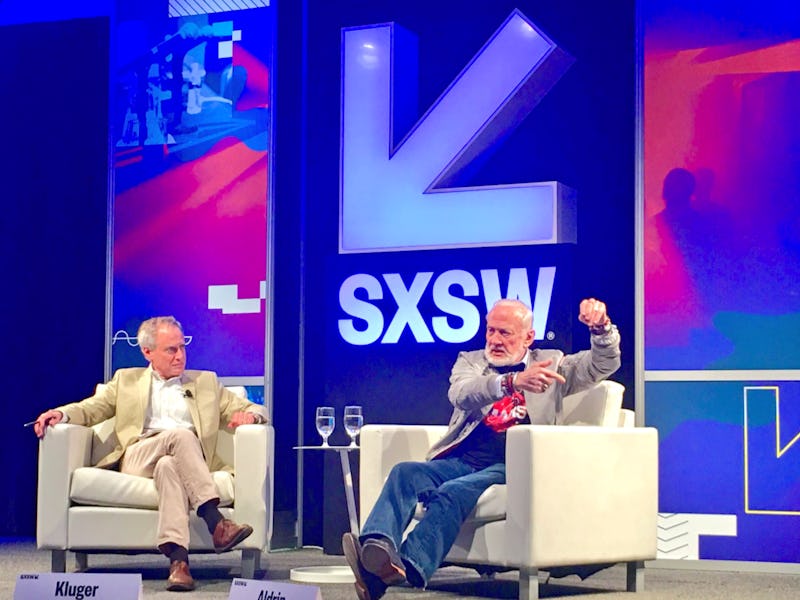Buzz Aldrin, the second person to ever walk on the moon, knows a thing or two about surviving on terrains beyond Earth. As such, he seems as qualified as anyone to weigh in on SpaceX founder and CEO Elon Musk’s plan to take humans to Mars in the next decade. And weigh in he has.
On Tuesday at a South by Southwest panel discussion in Austin, Aldrin called Musk’s vision for colonizing Mars “bodacious.” While people usually use the term to describe something as being audacious in an admirable way, Aldrin seems to simply mean Musk’s plan is audacious — and not entirely admirable.
“Why don’t you be smart about it and build things up first?” Aldrin says.
He points out that we need infrastructure already in place on Mars before we can send humans to live on the red planet. And he’s right. There are major obstacles that humans will need to overcome before we can actually build livable, operational colonies on Mars.
First of all, there’s the crucial issue of communication infrastructure. SpaceX does not have it in place and has not announced plans to establish it. And before we can even think of problems like sovereignty or planetary protection, Mars colonists will need to solve the basic problems of life, such as how to secure water and energy, and how to protect surface-dwellers from dangerous UV radiation.
As far as obtaining water, if colonists situated themselves near the “recurring slope lineae” that scientists suspect are caused by flowing liquid water, they could be able to harvest useful quantities of water. Desalination requires a lot of energy, though, which poses its own problem.
To solve this, Musk has proposed shipping solar panels to Mars — a logistical challenge in and of itself. These would provide power to colonists while also powering a methane production facility to make more rocket fuel. This plan hinges on accessible water supplies, though, since the company would make methane from water and atmospheric carbon dioxide. So while it sounds like an innovative plan, it has a lot of necessary conditions that have yet to be confirmed.
This is not to say that colonizing Mars is a hopeless cause. But Aldrin appears critical of Musk’s cavalier approach, in which the transportation tycoon seems to downplay critical problems in favor of focusing on the big picture. During the panel, Aldrin brings up a meeting he had with Musk a few years ago.
“Well, now, when your dragon lands on Mars with people, is there going to be anything down there for you to live in or do?” he recalls asking. “It seemed as though he hadn’t given that a whole lot of thought,” says Aldrin. “He’s a transportation person. He’s not a housing person. He’s not a builder of towers.”
Aldrin, whose experience with crewed space travel informs his view that every contingency must be considered, thinks it’s not worth risking human lives if Martian colonists aren’t set up for success before they lift off.
“We’re going there at significant sacrifice, significant expense,” he says. “And our purpose, I believe, is to settle the planet Mars.”
